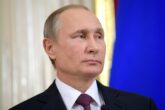November 01, 2022
Russia’s Dangerous Decline
Ukraine’s offensive in Kharkiv in September underscored the magnitude of Putin’s error. As Russian forces grew exhausted, losing momentum on the battlefield, Ukraine seized the initiative, dealing the Russian military a decisive blow. Ukraine’s battlefield successes revealed the extent of the rot in Putin’s army—the sagging morale, the declining manpower, the deteriorating quality of the troops. Instead of giving up, however, Putin responded to these problems by ordering a partial military mobilization, introducing tougher punishments for soldiers who desert or surrender, and moving forward with the illegal annexation of four Ukrainian regions. Putin reacted to Russia’s falling fortunes in Ukraine just as he did to its shrinking role on the world stage: dealt a losing hand, he doubled down on his risky bet. To Putin’s evident surprise, the war in Ukraine has accelerated long-standing trends pushing his country toward decline. Europe is moving to reduce its energy dependence on Russia, diminishing both the country’s leverage over the continent and the government revenues that depend heavily on energy exports. Unprecedented international sanctions and export controls are limiting Russia’s access to capital and technology, which will cause Moscow to fall even further behind in innovation. A year ago, we argued in these pages that reports of Russia’s decline were overstated and that Russia was poised to remain a persistent power—a country facing structural challenges but maintaining the intent and capabilities to threaten the United States and its allies. Putin’s disastrous invasion underscored the dangers of dismissing the threat from Russia, but it has also hastened the country’s decline. Today, Russia’s long-term outlook is decidedly dimmer.
Despite Russia’s conventional losses in Ukraine, its nuclear arsenal is a logical offset to its conventional vulnerability and poses a credible threat.
Given these factors, there will be a strong temptation to downgrade Russia as a threat. That would be a mistake, and not just because the war has yet to be won. In Ukraine and elsewhere, the more vulnerable Moscow perceives itself to be, the more it will try to offset those vulnerabilities by relying on unconventional tools—including nuclear weapons. In other words, Russian power and influence may be diminished, but that does not mean Russia will become dramatically less threatening. Instead, some aspects of the threat are likely to worsen. For the West, recognizing that reality means abandoning any near-term hopes of a chastened Russia and maintaining support for Russia’s targets. That effort should begin in Ukraine: the United States and its allies must provide sustained support to Kyiv to ensure that Russia suffers a defeat. But even if Putin loses, the problem that Russia poses will not be solved. In many ways, it will grow in intensity. So, too, should the response to it.
Read the full article from Foreign Affairs.
More from CNAS
-
Germany's New Defense Agenda
On April 9th, Friedrich Merz, the leader of Germany’s center-right Christian Democratic Union, secured a coalition agreement with the Social Democrats following his party’s vi...
By Andrea Kendall-Taylor & Jim Townsend
-
Trump ‘Humiliated’ as Putin Sends Clear Message That He Doesn’t Care About US
"Putin is not playing ball." Putin's Palm Sunday attack on Sumy is "embarrassing for the White House" as it comes just days after Steve Witkoff met with the Kremlin, says adju...
By Jim Townsend
-
The Hidden Past and Uncertain Future of the U.S. and Ukraine with Celeste Wallander
Under the Trump administration, U.S. support for Ukraine is no longer guaranteed. President Trump's pause on aid and intelligence to Ukraine in March may have been brief, but ...
By Andrea Kendall-Taylor, Jim Townsend & Celeste Wallander
-
Is Russia Under Pressure?
Since 2014, the United States and its allies have provided increasing military support to Ukraine while imposing more and tougher economic sanctions on Russia, especially sinc...
By Jeffrey Edmonds



